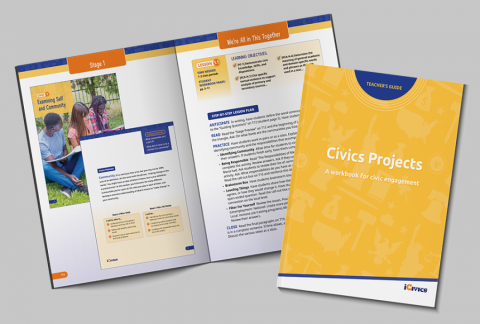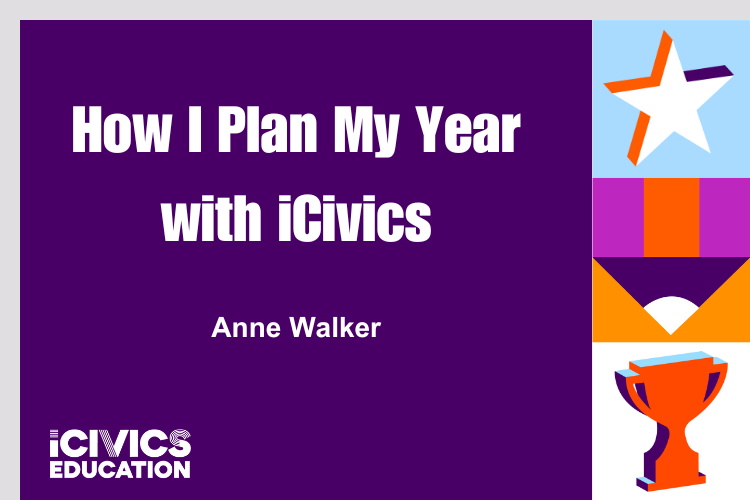If you’re a Massachusetts civics teacher, then you’ve been trying to figure out how best to lead the required 8th grade civics project. You’ve probably asked yourself: How am I going to approach this? How will I keep students engaged? How many weeks will I need? Then, after you’ve mapped out your ideas and expectations, you may find you still have a burning question.
How am I going to grade all this?
It’s a fair question. The implementation of the civics project can take six to eight weeks of class time, and that’s a long stretch to go without concrete assessment. So what can you do?
The Massachusetts Department of Elementary and Secondary Education’s (DESE) Civics Project Guidebook provides some ideas. It includes a general outline of assessment categories and sample competencies for making your own rubrics. But what if you need weekly grades in your gradebook? What if you want more direct assessments of student knowledge and skills? This is where the iCivics workbook can make your life a little easier.
An Abundance of Activities
The Civics Projects Workbook by iCivics follows the six stages of project development outlined in the DESE Guidebook. In each stage, there are several lessons consisting of a reading and follow-up activities. You can select the activities you want and grade each individually on an effort scale. Or, you can assign all the activities in a given stage and grade them as a group. The workbook provides a rubric at the end of each stage where all the activities can be combined for an overall stage grade.
As for the activities, the iCivics workbook provides plenty of options. Variety is the spice of life, and the same is true for civics project assessment.
- Do you want students to write? Each stage in the iCivics workbook, concludes with a writing prompt. The prompt asks students to reflect on something they learned or a skill they gained during that section of the project. The prompts are accessible by all students, but if they aren’t challenging enough, you can add another question, require specific examples, or ask students to write a story that describes what they learned. If that’s still not challenging enough, you can turn the reflection prompts into oral presentations or even formal essay assignments.
- Would you rather have quizzes? The iCivics workbook can help you create simple vocabulary quizzes. In all the readings, new concepts and terminology are printed in bold. You can easily skim the book’s pages to collect enough vocabulary for a quiz at the end of each stage.
All of this sounds good, but the biggest challenges in assessing the civics projects come when students are completing their action steps. This is when students are working in their groups to complete research, develop public awareness materials, conduct interviews, or plan events. How do you assess individual progress when each student and each group have different assignments? The iCivics workbook has you covered.
Assessing Action Steps
It contains several graphic organizers where students can show their research and planning. Each organizer provides another assessment opportunity. The workbook also includes individual and group tracking sheets. This is where students can list their weekly goals and track what they actually accomplished. The tracking sheets give students support for managing their work, and they give you a quick way to evaluate their progress. Lastly, in the workbook’s Appendix, there are templates for writing emails and scripting voicemail messages when contacting their local leaders. The templates can be completed by all students (not just the ones sending requests) and they can serve as yet another form of assessment.
So, while you’re planning your approach to the civics project this year, remember that iCivics has your back. Our workbooks provide the content and structure students need to be successful. And they provide you with enough assessment opportunities to keep your gradebook full.
Written by Lora De Salvo
Lora De Salvo is a Curriculum Associate at iCivics. She has 16 years of experience teaching U.S. history and U.S. government courses at the two-year college and high school levels. She has also worked as a training specialist with the Anti-Defamation League facilitating anti-bias and anti-bullying programs with middle and high school students.




